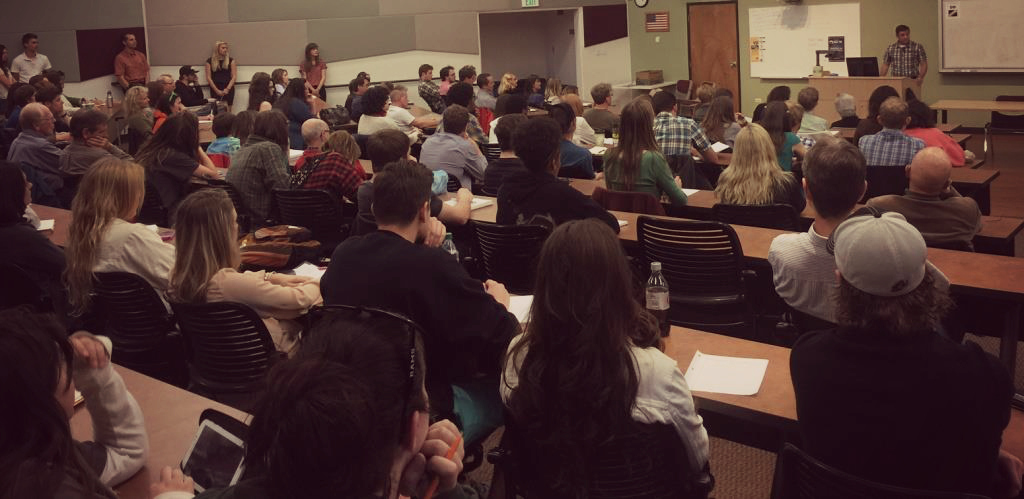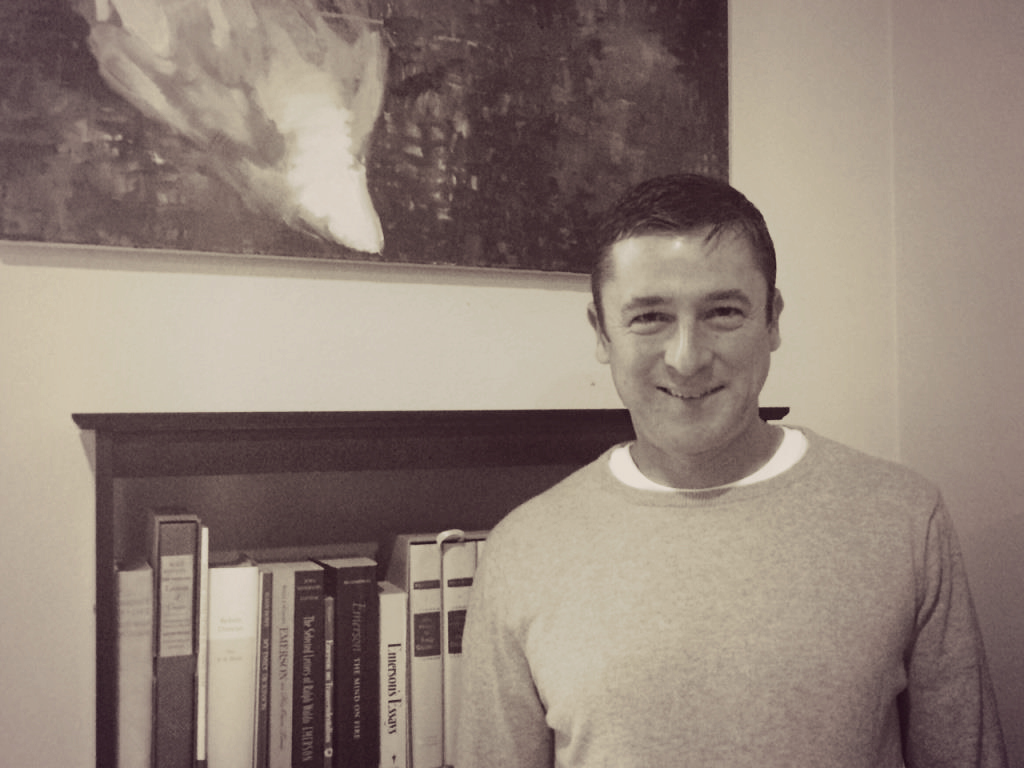
“Poetry, Art, the Humanities broadly speaking, offer us now as they have always offered us, a means not only of describing the world we see, but in describing it, also realizing it — that is, bringing it into reality, and so ushering ourselves into the very same.”
~Dan Beachy-Quick, from his Monfort Lecture, Considering the Made-Thing: Thoughts on Poetry, Ancient Greek, and the Strange Difficulty of Quietness
Each year, two faculty members are selected as Monfort Professors by a committee appointed by the Provost. They retain this designation for two years, and receive $75,000 per year to further their teaching and research. Associate Professor of Creative Writing Dan Beachy-Quick was named a Monfort Professor in 2013, the first ever from the Humanities. He was “flabbergasted” by the award — “This gift from the Monforts allows me to spend time with projects I otherwise wouldn’t be able to get to,” he said. “It’s an incredible honor, and I’m still shocked.” The funding allowed him to further his study of ancient Greek, work on independent creative projects such as the novel, essays and a book of poetry, and organize a three-day symposium titled “Crisis in Creativity,” to take place this July at CSU.
From July 22-24 we’ll be holding the Monfort Symposium on “Crisis and Creativity.” Three invited guests, the artist Michael Swaine, the poet-activist Brenda Hillman, and esteemed CSU environmental scientist Diana Wall, will be joining artists, writers, sociologists, archeologists from around the country for morning workshops seeking means of conversation and collaboration between the Humanities and the Scientists that reach toward an engaged consideration of current crises. These morning sessions will have room for members of the CSU community to join in. Afternoons will be devoted to working in “maker’s spaces” in which participants, and any one in the community who wants to join in, gather together to take the morning’s ideas and begin the work of making in response to them: ceramics, writings, poems, paintings, papers, projects . . . Each evening will have an event wholly open to the public as well, ranging from presentations/readings by Michael Swaine and Brenda Hillman, to a panel discussion on the last night of the Symposium with all three invited guests. A full schedule of events, places, times, will be coming in mid-May. Please be in touch with me [Dan Beachy-Quick] if you’re interested in learning more or in participating in all or any capacity.
When Beachy-Quick’s Monfort Professorship was first announced, Louann Reid, chair of the English department, said Beachy-Quick “brings that rare combination of great talent and great teaching to his work,” and also,
As the first Monfort Professor from the humanities, Dan brings a perspective to the work this professorship makes possible that is deeply grounded in the exploration, understanding and articulation of human experience. Already recognized as one of the top poets of his generation, he is an outstanding teacher and generous colleague.
In the recent lecture given at the end of his term as a Monfort Professor, Beachy-Quick said that “the work of imagination isn’t an escape from the world, but an initiation into it.” This belief is embodied in his work. Since joining CSU in 2007, he has published a number of literary collections, 26 articles and more than 75 poems, stories and reviews. Beachy-Quick teaches graduate seminars, poetry workshops and an array of undergraduate literature courses. His Monfort lecture included readings from his book-length essay on silence, as well as a discussion of the important role the humanities plays in the way society deals with current events and pressing issues. (A free pdf chapbook of Dan Beachy-Quick’s early sections of “A Quiet Book” is available at Essay Press: http://www.essaypress.org/ep-23/).
Beachy-Quick said he is concerned that the humanities have fallen to the wayside of central conversations at universities across the country. “I want to bring to light some of the larger ecological and philosophical concerns about humanities in a STEM-based university,” he said in a recent interview with CSU SOURCE. “The university system arose from the humanities. We need as multi-faceted of an approach to the problems we are facing as possible.”
Beachy-Quick may be completing his term as a Monfort Professor, but he is far from done with this work. He has just been named a fellow by the John Simon Guggenheim Memorial Foundation. Guggenheim fellowships are awarded on the basis of past achievements and the promise of future accomplishments. Beachy-Quick is the first CSU professor from the humanities to win the prestigious award (the three previous Guggenheim fellows were all scientists), and only the fourth professor from the university. The award will enable him to spend the next year writing.
My hope is to continue working on a long, meandering essay — one that verges from prose to poetry and back again, that combines the personal with the study of many other texts — that focuses (if that’s the right word) on silence, forgetting, obscurity and so on. I’m going to make a couple of trips to archival libraries at Yale and Harvard, as well as a study trip to ruins in Italy or Greece.
“Receiving the Guggenheim places Professor Beachy-Quick in the company of the very finest poets, writers, artists and scholars, and it propels Colorado State University’s fine creative writing program to elite status,” said Ann Gill, dean of the College of Liberal Arts. Several established writers and poets who have reviewed his work, have called him “a fully established American artist” and “one of the most interesting poets – and thinkers – of our generation.” Another, Lyn Hejinian, a poet, referred to Whaler’s Dictionary, his study of Moby Dick, as a “major work written by one of America’s most significant young poets.”
